Related Research Articles
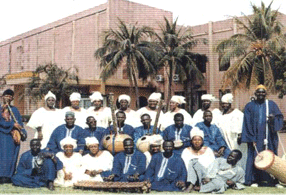
The music of Mali is, like that of most African nations, ethnically diverse, but one influence predominates: that of the ancient Mali Empire of the Mandinka. Mande people make up around 50% of Mali's population; other ethnic groups include the Fula (17%), Gur-speakers 12%, Songhai people (6%), Tuareg and Moors (10%).

The music of Niger has developed from the musical traditions of a mix of ethnic groups; Hausa, the Zarma-Songhai, Tuareg, Fula Kanuri, Toubou, Diffa Arabs and Gurma and the Boudouma from Lac Chad.

Tinariwen is a collective of Tuareg musicians from the Sahara region of northern Mali. Considered pioneers of desert blues, the group's guitar-driven style combines traditional Tuareg and African music with Western rock music. They have released nine albums since their formation and have toured internationally.
Afel Bocoum is a musician from Mali, noted as a singer and guitarist. He began his career as a member of Ali Farka Touré's group ASCO, and Toure is often regarded as his mentor. Both men come from the town of Niafunke on the River Niger, and are members of the Sonrai people. Bocoum is an agricultural advisor by profession.
The Rail Band is a Malian band formed in 1970; it was later known as Super Rail Band, Bamako Rail Band or, most comprehensively and formally, Super Rail Band of the Buffet Hotel de la Gare, Bamako.

The Festival au désert was an annual concert in Mali, showcasing traditional Tuareg music as well as music from around the world between 2001 and 2012. It was founded and directed by Manny Ansar, and attracted thousands of visitors, bringing a huge boost to the economy.

Articles related to Mali include:

Amassakoul is a 2004 album by the Tuareg band Tinariwen. In a review of the album, Chris Nickson of AllMusic stated, "This is angry and passionate; it's dangerous music in the very best sense. Western bands might have forgotten how to rock as if their lives depended on it; Tinariwen can teach them." Jon Lusk of the BBC noted, "you'll be happy to discover that this music has a similar power to transport you to the heats of the Sahara." In a review of the album, PopMatters concluded that "this is a band whose music is not only mesmerizing but is destined to find wide appeal to many listeners of all ages."

Tishoumaren or assouf, internationally known as desert blues, is a style of music from the Sahara region of northern and west Africa. Critics describe the music as a fusion of blues and rock music with Tuareg, Malian or North African music. Various other terms are used to describe it including desert rock, Saharan rock, Takamba, Mali blues, Tuareg rock or simply "guitar music". The style has been pioneered by Tuareg musicians in the Sahara region, particularly in Mali, Niger, Libya, Western Sahara, Algeria, Burkina Faso and others.
Dambé: The Mali Project is a documentary film directed by Dearbhla Glynn, and produced by Vanessa Gildea. The film documents as the Irish musicians Liam Ó Maonlaí and Paddy Keenan embark on a musical adventure to Mali in West Africa. Travelling over 3,000 miles they meet and collaborate with people from musicians to nomadic herders, culminating in a performance at the remote musical festival Festival au Désert.

Ali Ibrahim "Ali Farka" Touré was a Malian singer and multi-instrumentalist, and one of the African continent's most internationally renowned musicians. His music blends traditional Malian music and its derivative, African American blues and is considered a pioneer of African desert blues. Touré was ranked number 76 on Rolling Stone's list of "The 100 Greatest Guitarists of All Time" and number 37 on Spin magazine's "100 Greatest Guitarists of All Time".
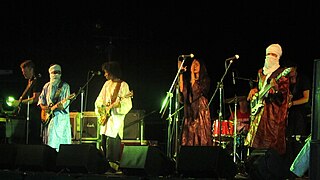
Tamikrest is a group of musicians who belong to the Tuareg people. The band was founded in 2006 in Kidal, Mali. They mix traditional African music with Western rock and pop influences and sing in Tamashek. The main songwriter and leader of the band is Ousmane Ag Mossa.
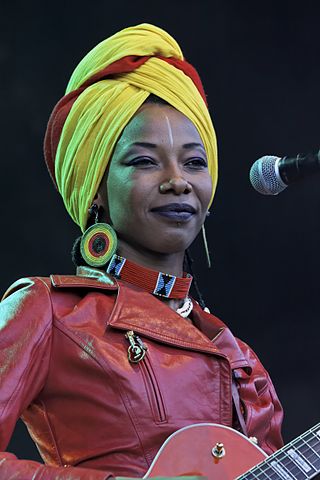
Fatoumata Diawara is a Malian singer-songwriter currently living in France.

Tassili is the fifth album by the Tuareg-Berber band Tinariwen, recorded in Tassili n'Ajjer, an Algerian national park in 2011. The album marked a major departure from previous recordings. The producer, Ian Brennan, stated that it "was the least overdubbed, most live, band-centric and song-oriented record they have done.”
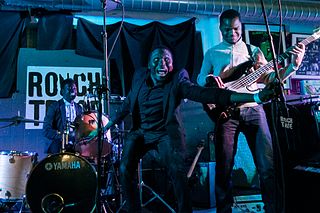
Songhoy Blues is a desert blues music group from Timbuktu, Mali. The band was formed in Bamako after being forced to leave their homes during the civil conflict and the imposition of Sharia law. The band released its debut album, Music in Exile, via Transgressive Records on February 23, 2015, while Julian Casablancas' Cult Records partnered with Atlantic Records to release the album in North America in March 2015. The group is one of the principal subjects of the documentary film They Will Have To Kill Us First.

Noura Mint Seymali is a Mauritanian griot, singer, songwriter, and instrumentalist.
Africa Express is a UK-based non-profit organization that facilitates cross-cultural collaborations between musicians in African, Middle Eastern, and Western countries. It seeks to help African musicians break beyond the stigmas and prejudices of the term world music, while presenting a positive impression of Africa to counter against common media images of war, famine, and disease. Notable events that Africa Express has been involved in include performances at the 2012 Olympics, the Glastonbury Festival, the BBC Electric Proms, Denmark's Roskilde Festival, a tour of Syrian refugee musicians, and concerts in such places as Mali, the Congo, Ethiopia, Nigeria, South Africa, and France.
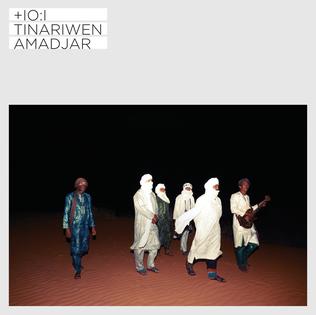
Amadjar is the eighth album by the Tuareg band Tinariwen, released on September 6, 2019. The album's title means "the foreign traveler" in the Tamashek language. The album features guest appearances by Noura Mint Seymali, Micah Nelson, Cass McCombs, Stephen O'Malley, Warren Ellis, and Rodolphe Burger. The album reached number 74 on the Ultratop albums chart in Belgium.
References
- ↑ Nastos, Michael G.. Tartit at AllMusic. Retrieved 22 April 2014.
- 1 2 3 4 "Timbuktu, Dakar, Fes Flight Plan". Afropop Worldwide (archived broadcast). PRI. 2012-04-12 [Festival in the Desert segment originally recorded and broadcast in 2003]. Event begins at 7:43. Retrieved 2012-05-27.
- 1 2 "Bio - More About Caravan for Peace and its Artists". Rock Paper Scissors. 2013. Retrieved 2013-08-16.
- 1 2 3 4 Eyre, Banning (2013-07-19). "Caravan Pour la Paix Brings Mali Desert Vibe to Montreal". Afropop Worldwide. World Music Productions. Retrieved 2013-08-16.
- 1 2 3 Morgan, Andy (February 2013). "Music, Culture and Conflict in Mali" (PDF). Freemuse. pp. 35–36. Retrieved 2013-03-03.
- ↑ "Caravan for Peace: Mali's Call for Peaceful, Dialogue Comes to the US this Summer" (Press release). Rock Paper Scissors. 2013. Retrieved 2013-08-16.
- ↑ Rohter, Larry (2013-07-30). "Musical Nomads, Escaping Political Upheaval". The New York Times . Retrieved 2013-08-16.